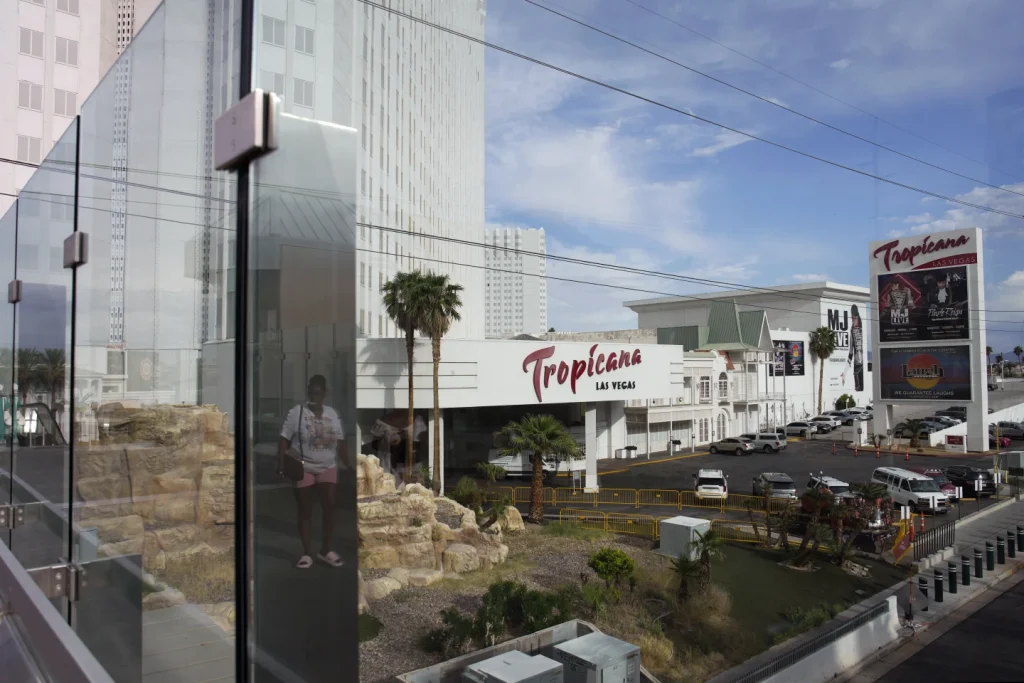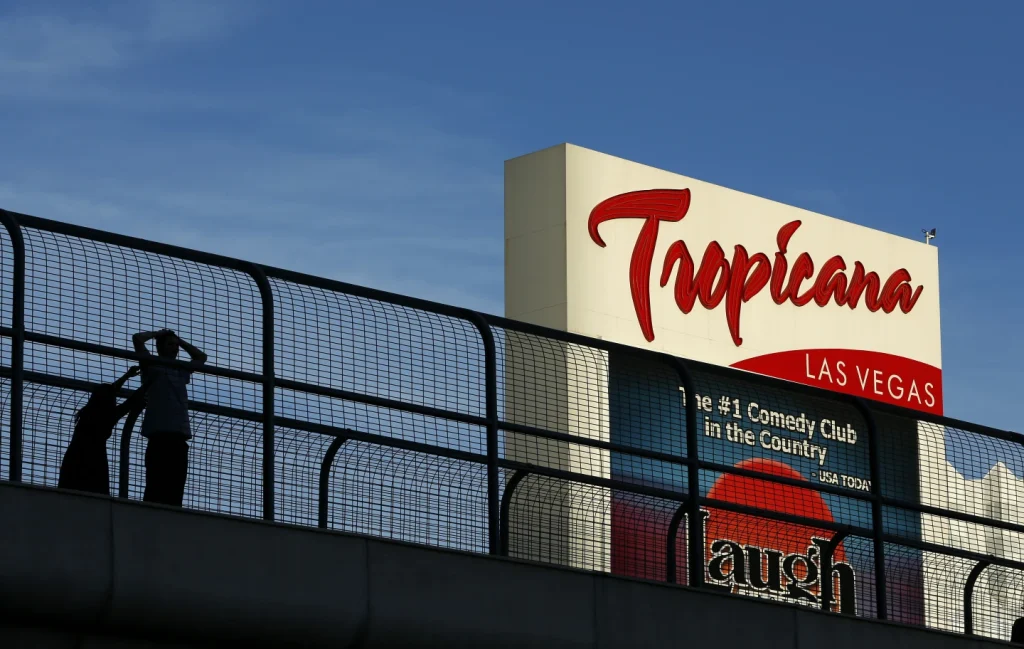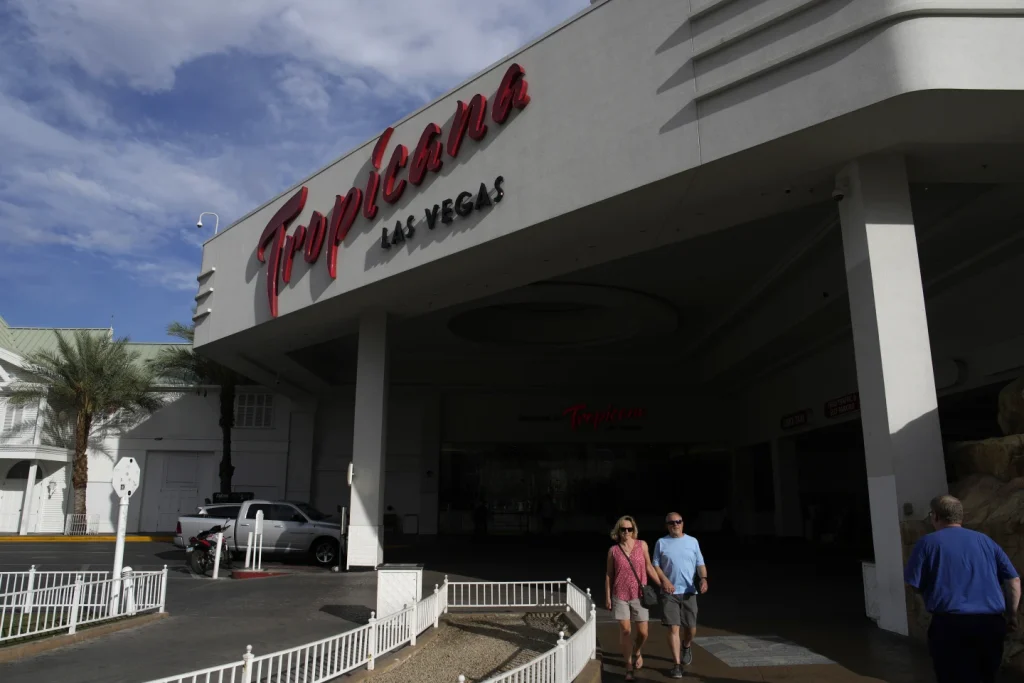The Tropicana Las Vegas, an iconic hotel-casino that has stood as a symbol of the vibrant allure of Sin City for over six decades, is now poised to close its doors permanently.
This decision comes as part of a significant development plan, as the establishment will pave the way for a $1.5 billion Major League Baseball stadium, which is set to become the new home for the Oakland Athletics.
The impending closure, scheduled for April 2, marks the end of an era for the Tropicana, a venue that has held a storied past, including ties to the mob and a reputation as the “Tiffany of the Strip.”
The announcement of the Tropicana’s closure was made by its owner, Bally’s Corp., signaling the beginning of preparations for the hotel-casino’s eventual demolition.
In a statement, Bally’s president, George Papanier, emphasized the significance of the forthcoming baseball stadium, referring to it as a “once-in-a-lifetime opportunity.”
The company expressed its anticipation for the development of a new resort and ballpark, envisioning these as future landmarks that will pay homage to the rich history and global appeal of Las Vegas, a city that draws nearly 50 million visitors annually.
The Tropicana’s inauguration in 1957 coincided with a pivotal moment in the history of Las Vegas. At that time, the population of Clark County, which encompasses the city, had just surpassed 100,000.
The Las Vegas Strip, where the Tropicana was situated, had not yet been adorned with the colossal megaresorts that define its skyline today.
The Flamingo, another renowned hotel-casino, had been operational for a decade, while the high-rise Stardust made its debut the following year, at a cost of $8.5 million.
During its early years, the Tropicana was celebrated for its opulence, featuring mosaic tiles and mahogany panels throughout its premises.
A striking tulip-shaped fountain graced its entrance, and every hotel room boasted a balcony, adding a touch of luxury to the guest experience.
The impending closure of the Tropicana Las Vegas marks the end of an era, but it also signals the dawn of a new chapter in the city’s history.
As the city continues to evolve and redefine itself, the legacy of the Tropicana will endure in the memories of those who have experienced its grandeur.
The forthcoming Major League Baseball stadium and the promise of a new resort serve as a testament to the enduring allure of Las Vegas and its ability to reinvent itself, ensuring that its status as a global destination remains unshakable.
The Tropicana Las Vegas will forever hold a place in the annals of Las Vegas history, a testament to the city’s evolution from a burgeoning desert town to a world-renowned entertainment capital.
As the city continues to evolve and redefine itself, the legacy of the Tropicana will endure in the memories of those who have experienced its grandeur.
The forthcoming Major League Baseball stadium and the promise of a new resort serve as a testament to the enduring allure of Las Vegas and its ability to reinvent itself, ensuring that its status as a global destination remains unshakable.
The allure of Las Vegas has captivated the world for decades, drawing millions of visitors to its lavish hotels, vibrant casinos, and dazzling entertainment.
Yet, behind the glittering facade of the Tropicana Casino lies a history intertwined with the shadowy underworld of organized crime, the resilience of its entertainment legacy, and the ever-evolving landscape of the Las Vegas Strip.
In the annals of the Tropicana’s history, the presence of reputed mobster Frank Costello casts a long shadow.

As revealed by Green, a member of The Mob Museum’s board of directors in downtown Las Vegas, the casino’s opening was marred by connections to the mob.
Following the grand opening, Costello’s survival of a gunshot wound in New York unveiled a chilling revelation—a piece of paper in his coat pocket bearing the Tropicana’s exact earnings figure and a note referencing “money to be skimmed” for Costello’s associates.
This unsettling episode underscored the deep entrenchment of organized crime within the Tropicana’s early years.
The 1970s brought further scrutiny as federal authorities uncovered a web of conspiracy, leading to charges against numerous mob operatives in Kansas City for skimming nearly $2 million in gambling revenue from Las Vegas casinos, including the Tropicana.
The resultant convictions linked to the Tropicana served as a stark reminder of the casino’s entanglement with illicit activities during this tumultuous era.
However, amidst these dark shadows, the Tropicana also experienced a trajectory of mob-free success. It burgeoned into a renowned hotel-casino, expanding to include two hotel towers and introducing iconic entertainment spectacles.
The debut of the long-running topless show “Folies Bergere” in 1959, immortalized in the 1964 Elvis Presley film “Viva Las Vegas,” marked a significant milestone in the Tropicana’s cultural footprint.
Notably, magicians Siegfried Fischbacher and Roy Horn launched their careers within the show, adding to the casino’s storied entertainment history.
The Tropicana’s stage witnessed the performances of A-list luminaries such as Sammy Davis Jr., Louis Armstrong, and Gladys Knight, cementing its status as a premier entertainment destination.
Furthermore, in 1998, daredevil showman Robbie Knievel achieved a record-breaking motorcycle jump outside the hotel, soaring 231 feet over a line of limousines.
These iconic moments underscore the Tropicana’s enduring legacy as a cultural and entertainment hub within the Las Vegas landscape.
Today, the Tropicana’s presence at the southern end of the Las Vegas Strip intersects with a major thoroughfare bearing its name, surrounded by towering megaresorts and emblematic venues.
The casino’s location amid this vibrant tapestry reflects its enduring significance within the ever-evolving fabric of Las Vegas.
In a recent turn of events, the Tropicana faces a new chapter as Bally’s, its current owner, announced plans to cease hotel bookings and initiate a transition that aligns with the forthcoming development of a ballpark on its grounds.
This transformation, backed by substantial public funding, signals a pivotal juncture in the Tropicana’s evolution, as it prepares to make way for a new era of development and growth within the city.
Amidst these changes, the Tropicana’s dedicated workforce, many of whom have contributed their talents for decades, faces a period of transition.
The Culinary Workers Union, representing approximately 500 employees, secured a new five-year contract with the Tropicana, providing a measure of stability during this transformative phase.
The inclusion of a severance package, offering $2,000 for each year of service, aims to alleviate the challenges that may arise for the casino’s longstanding employees.
As the Tropicana undergoes this period of transition, it stands as a testament to the enduring spirit of Las Vegas, where the past intertwines with the present, and where resilience and reinvention define its legacy.
The forthcoming development of the ballpark and the city’s continued evolution underscore the dynamic nature of Las Vegas, where change is not merely inevitable but embraced as a catalyst for progress.
In conclusion, the Tropicana Casino’s narrative is a tapestry woven with threads of intrigue, resilience, and transformation.

From its shadowy ties to organized crime to its celebrated entertainment legacy and the impending ushering of a new era, the Tropicana embodies the spirit of Las Vegas—a city where the pursuit of reinvention and innovation is as timeless as its dazzling lights and enduring allure.
